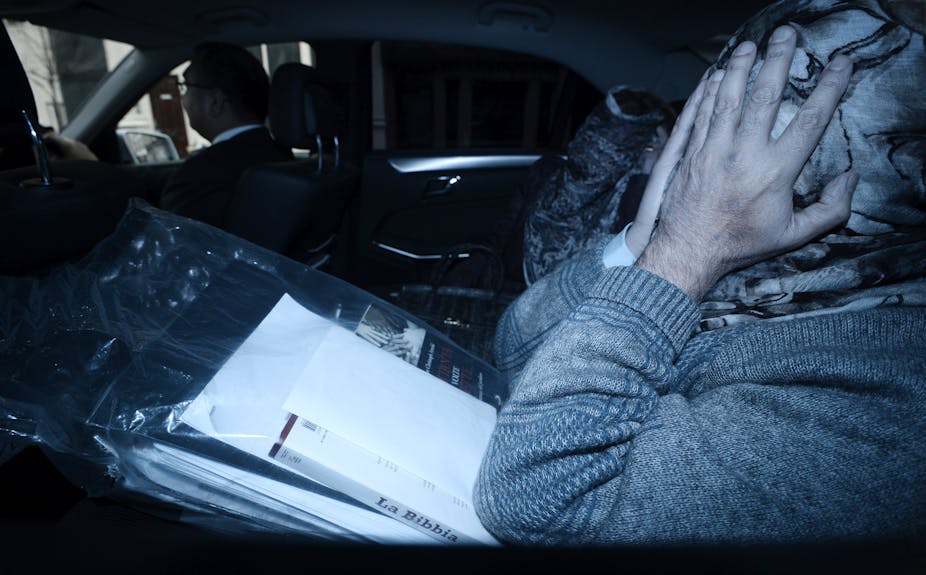We are all still fascinated by images of mafia bosses as they appear in novels and films, as was made clear by the frenzy of interest in Domenico Rancadore, the convicted mafioso found to have been hiding out in west London for 20 years. But the mafia has moved with the times and its presence abroad can vary from local criminal groups settled to a financial presence.
These days, it is far more likely that the mafia is capitalising on the international nature of business and is a financial player. But foreign authorities have been slow to catch on.
Despite the Rancadore case, there has not, to date, been any English-initiated investigation into Italian mafia activities in the UK. We only know about Rancadore because he was wanted by the Italian authorities – and if one mafioso can hide out in London for two decades, what else is going on under the radar?
We don’t have a clear picture of what Italian mafias are up to outside Italy these days, but given the international nature of business of all kinds, it seems unlikely that the world’s most notorious criminal outfits wouldn’t take advantage of opportunities on offer abroad.
Indeed, the Italian newspaper, il Fatto Quotidiano, recently highlighted a case in Frauenfeld, Switzerland, where it is believed that a Calabrian mafia group has been operating for the past 40 years with roots in the local community.
Although it had a certain amount of autonomy, it was still dependent on ‘Ndrangheta clans in Calabria, adopted a traditional internal structure (with affiliation rituals and set roles, tasks and rules) and was involved in extortion rackets and drugs in its adopted country. This is more a physical presence.
International business
After an 18-month court battle, the British authorities have decided to extradite Rancadore, a convicted member of the Sicilian Mafia. Back in Italy, he is to serve a seven-year sentence for “mafia association”.
Rancadore had been living in Uxbridge in West London for 20 years without being found. Even after his arrest it was uncertain that he would ever be sent back to Italy. He initially won his fight against extradition and can still appeal this latest ruling. But if he is allowed to remain in the UK, that will simply tell the world that the UK is a safe haven for condemned Italian mafia bosses.
The British authorities have always taken a somewhat ambiguous approach to Italian mafia cases. There was, for example, Michele Siciliano, a member of the La Torre Camorra clan. Siciliano was arrested in Walton-on-Thames in 1995 at the request of the Italian authorities but was soon free to go about his business in Aberdeen because of a lack of understanding of Italian laws on mafia activity.
Siciliano had been arrested on preventive measures before his court case because he was considered by judges to be socially dangerous in Italy but this meant little to the UK authorities. He was finally captured on a European arrest warrant and extradited in 2005.

Siciliano is a classic example of an Italian “businessman” who left Italy to evade possible punishment for his mafia dealings – but this all happened back in the 1990s. Italian mafias have moved on and adapted to the times. Often, they are not necessarily physically located in the UK or abroad to have business interests there.
Mafias have evolved into efficient organisations and London looks like an ideal location for money laundering operations. It has, in particular, top professionals who know where and how to invest money without the source being detected. They are enablers and facilitators, employed to spread mafia money, such as by setting up businesses abroad.
Given what we know about the Swiss case and what we know about legitimate international business operations, could it possibly be that the mafia does not have people or financial interests in the UK? And given the likely harm mafia activities do to the British economy, can the UK afford not to at least look into it?
Underground economy
In Italy, professional enablers make business deals with mafia money without the knowledge of the authorities. They invest the money and recycle it through newly established or shell companies. Is it unreasonable to suggest that they are also doing this in London and the UK as they do in Switzerland, Germany, Spain or France?
To tackle the problem, it is useful to understand what draws mafia money to the UK. Spain, for example, is considered a preferred destination for Neapolitan camorristi. Once they have decided or are forced to leave Naples, considerations such as the weather, proximity to Italy and culture help. But, what also appeals is the promise of relatively lax policing, and the opportunity to buy cocaine and hashish in one of Europe’s most lucrative retail market to sell on in Naples.
The UK offers financial opportunities for money laundering without easy detection. We now live in a global village where legitimate businessmen travel the globe, communicate instantly and are continuously making transnational deals. Enablers can do the same for their clients.
So while it might seem exciting to think that a Sicilian mafia man has been hiding out in Uxbridge for years without anyone realising, the UK may have more serious problems with mafia money circulating below the radar in peace and quiet.

